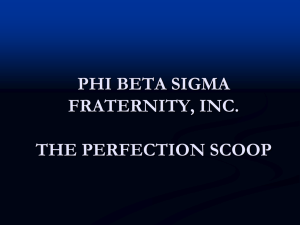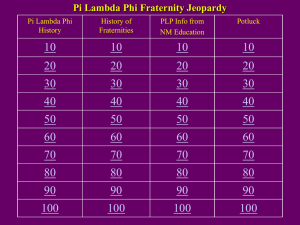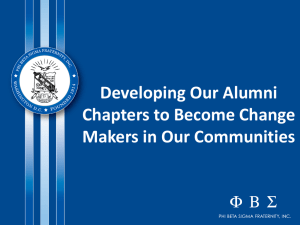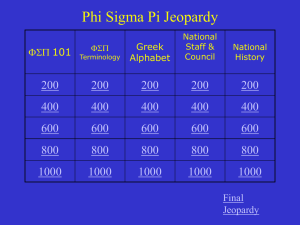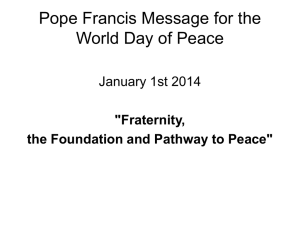Tau Delta Phi Fraternity Leadership Development Resources
advertisement
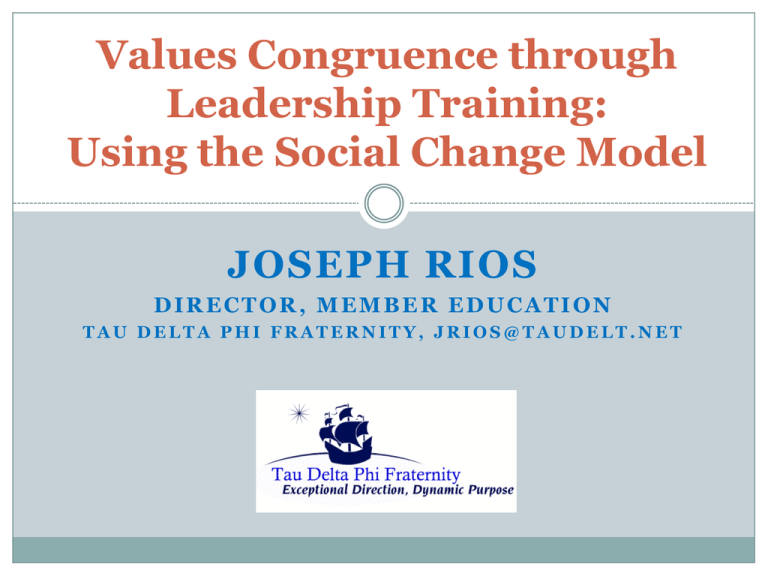
Values Congruence through Leadership Training: Using the Social Change Model JOSEPH RIOS DIRECTOR, MEMBER EDUCATION TAU DELTA PHI FRATERNITY, JRIOS@TAUDELT.NET Agenda Introductions What Do You Want Your Students to Learn? Values-Based Leadership What is the Social Change Model The Relationships of the Dimensions Individual Values Group Values Society/Community Values Small Group Exercise Working Toward Change Tau Delta Phi Fraternity Leadership Development Resources What Do You Want Your Students to Learn? When you think about what you’re tasked to accomplish as an advisor with your students – what are the overarching outcomes you want them to learn? Tau Delta Phi Fraternity Leadership Development Resources Values-Based Leadership What does it mean to lead through your values? “Values-based leadership is the exercise of influence in relationships, teams, organizations and communities through choices and decisions guided by explicit and consistently practiced values that balance healthy self-interest and the common good.” The Institute of Values-Based Leadership: Defining Values-Based Leadership http://values-based-leadership.institute.royalroads.ca/content/what-values-based-leadership Tau Delta Phi Fraternity Leadership Development Resources Values-Based Leadership Why is it critical for Greek Life professionals to educate about values congruence? “It is evident that although chapters build community and friendships through their activities, they still foster destructive values like alcohol abuse, homogeneity, and poor cognitive development…. Professionals, both campus-based and organizational, should capitalize on opportunities to address incongruence. By knowing what fraternity and sorority members value, one can move past conversations confined to organizational creeds into an action-based approach by helping develop programs, activities, and behaviors that connect the enacted and espoused values. (Matthews et al., 2009) Oracle: The Research Journal of the Association of Fraternity Advisors Vol. 4, Iss. 1, February 2009 Tau Delta Phi Fraternity Leadership Development Resources What is the Social Change Model? Established in 1994, the Social Change Model approaches leadership as a purposeful, collaborative, values-based process that results in positive social change. The Model was built upon the following assumptions: Leadership is socially responsible, it impacts change on behalf of others. Leadership is collaborative. Leadership is a process, not a position. Leadership is inclusive and accessible to all people. Leadership is values-based. Community involvement/service is a powerful vehicle for leadership. The Model is sometimes called the 7Cs for Change because it espouses seven values of leadership that occur on three dimensions with the goal of positive social change. Each dimension interacts with one another as shown below. Tau Delta Phi Fraternity Leadership Development Resources The Relationship of the Dimensions Consciousness of Self Congruence Commitment Change Citizenship Collaboration Common Purpose Controversy with Civility Tau Delta Phi Fraternity Leadership Development Resources Individual Values Consciousness of Self means being aware of the beliefs, values, attitudes, and emotions that motivates one to take action. Congruence refers to thinking, feeling, and behaving with consistency, genuineness, authenticity, and honesty towards others. Congruent persons are those whose actions are consistent with their most deeply-held beliefs and convictions. Commitment is the psychic energy that motivates the individual to serve and that drives the collective effort. Commitment implies passion, intensity, and duration. It is directed toward both the group activity as well as its intended outcomes. Higher Education Research Institute. (1996) A social change model of leadership development. (3rd ed.). College Park, MD: National Clearinghouse for Leadership Programs. Tau Delta Phi Fraternity Leadership Development Resources Group Values Collaboration is to work with others in a common effort. It constitutes the cornerstone value of the group leadership effort because it empowers self and others through trust. Collaboration multiplies group effectiveness by capitalizing on the multiple talents and perspectives of each group member and on the power of that diversity to generate creative solutions and actions. Common Purpose means to work with shared aims and values. It facilitates the group’s ability to engage in collective analysis of the issues at hand and the task to be undertaken. Common purpose is best achieved when all members of the group share in the vision and participate actively in articulating the purpose and goals of the leadership development activity. Controversy with Civility recognizes two fundamental realities of any creative group effort: those differences in viewpoint are inevitable, and that such differences must be aired openly but with civility. Civility implies respect for others, a willingness to hear each others’ views, and the exercise of restraint in criticizing the views and actions of others. Higher Education Research Institute. (1996) A social change model of leadership development. (3rd ed.). College Park, MD: National Clearinghouse for Leadership Programs. Tau Delta Phi Fraternity Leadership Development Resources Society/Community Values Citizenship is the process whereby an individual and the collaborative group become responsibly connected to the community and the society through the leadership development activity. To be a good citizen is to work for positive change on the behalf of others and the community. Citizenship thus acknowledges the interdependence of all who are involved in or affected by these efforts. Good citizenship thus recognizes that effective democracy involves individual responsibility as well as individual rights. Higher Education Research Institute. (1996) A social change model of leadership development. (3rd ed.). College Park, MD: National Clearinghouse for Leadership Programs. Tau Delta Phi Fraternity Leadership Development Resources Group Brainstorm In small groups, brainstorm an activity to help students on your campus understand one of the Social Change Model Dimensions. New Member Development Officer Training Governing Council Training Retreats & Workshops Consciousness of Self Congruence Commitment Collaboration Common Purpose Controversy with Civility Citizenship Tau Delta Phi Fraternity Leadership Development Resources Proposed New Officer Retreat Agenda •Who Are You/Team Builders Consciousness of Self – What values does each officer bring to the position? To the college? What are the shared values among all the officers? What are similarities to capitalize on? •Group Expectations Congruence – In small groups, officers discuss what their shared values congruence looks like/sounds like. Expectations are shared. •Accountability •Trust-Builder Exercise Commitment – Officers discuss what competing commitments will keep them from giving 100% and what motivates them to succeed. Competing priorities are shared so commitment is clearly articulated. Collaboration – Trust-building exercises should be incorporated so that new team dynamics begin to take hold. Highlight connections among all positions so proposed goals are clear for everyone to achieve. Common Purpose – Develop/update Vision/Mission/Goals for the current Board. Discuss how each positions helps others reach all goals. Controversy with Civility – How will officers hold each other accountable? Confront each other? Discuss communication styles, or administer communication styles workshop like the DISC. Citizenship –How will the officers work to impact the larger Greek community? The campus community? The city or region? •Goal Setting •Communication Styles/Conflict Styles •Who Are We/ Taking It Back Home Tau Delta Phi Fraternity Leadership Development Resources Proposed New Member Training Consciousness of Self – Ask new members: Where did your values come from? How have they changed? What values do you have that matter to you most? To your new chapter? To the Fraternity/Sorority community? What are the shared values among all the members? Congruence – By chapter, new members discuss what their shared values congruence looks like/sounds like. Expectations are shared on how values should be lived daily. Discuss the stereotypes of Fraternity/Sorority members and the connection to incongruent values. Commitment – New members discuss what other competing commitments will keep them from giving 100% and what motivates them to succeed. Time management & priority making discussed. Collaboration – Trust-building exercises should be incorporated so that new team dynamics begin to take hold across chapters. Common Purpose – As new members of the Greek community, what is a new vision that the new members can work toward? What can new members do to engage in the community? Controversy with Civility – How will new members confront actions of their older brothers and sisters? Among other new members? Citizenship –How will the new members work to impact the larger Greek community? The campus community? The city or region? Tau Delta Phi Fraternity Leadership Development Resources Change Change refers to the ability to adapt to environments and situations that are constantly evolving. The ability to adapt effectively while maintaining the core functions of the group is a skill necessary in effective leaders. Higher Education Research Institute. (1996) A social change model of leadership development. (3rd ed.). College Park, MD: National Clearinghouse for Leadership Programs. Tau Delta Phi Fraternity Leadership Development Resources Social Change Model Resources Leadership for a Better World: Understanding the Social Change Model of Leadership Development – Instructor’s Manual http://www.nclp.umd.edu/include/pdfs/publications/leadership_for_a_better_world.pdf A Social Change Model of Leadership Development Guidebook http://socialchangemodel.ning.com/page/books-and-publications Tau Delta Phi Fraternity Leadership Development Resources Values Congruence through Leadership Training: Using the Social Change Model JOSEPH RIOS DIRECTOR, MEMBER EDUCATION TAU DELTA PHI FRATERNITY, JRIOS@TAUDELT.NET

